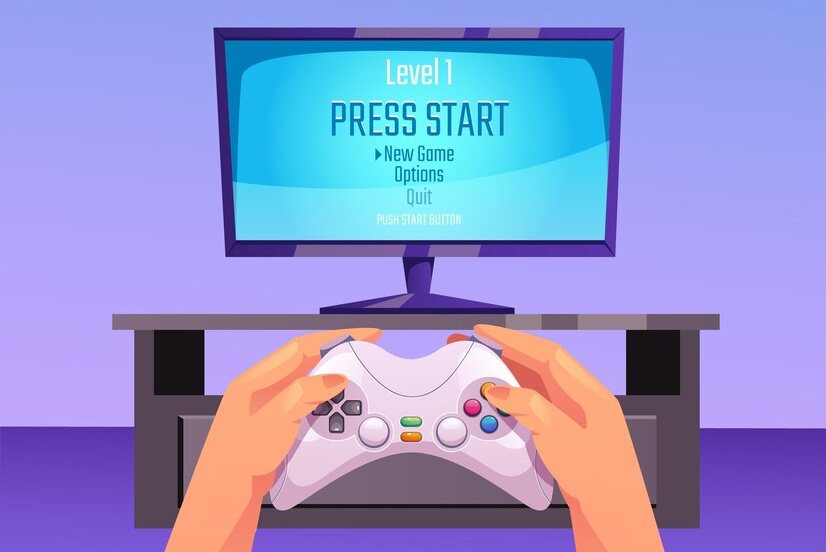How Video Games Improve Problem-Solving Skills

Video games often get a bad rap as a “waste of time” or “mind-numbing entertainment.” But did you know that gaming can help develop valuable problem-solving skills? That’s right – all those hours spent puzzling through levels, optimizing builds and outsmarting opponents may be giving your brain a powerful cognitive workout. Here’s how video games can level up your problem-solving prowess in surprisingly practical ways.
Video Games Teach Critical Thinking
At their core, most video games have elaborate problem-solving challenges in disguise. To progress, players must analyze complex situations, break them down into manageable steps, and develop creative solutions – all while adapting to constantly changing variables.
This dynamic problem-solving environment can sharpen critical thinking skills that transfer far beyond the virtual realm. A 2013 review published in the American Psychological Association found that regular gamers consistently outperformed non-gamers on tests of critical thinking, reaction time and accuracy. The more cognitively complex the game, the greater the benefit.
Tips to Maximize the Brain Boost
- Play strategy-heavy games that require planning, resource management and on-the-fly decision-making. MOBAs, 4X games and RTS titles are great for flexing your critical thinking skills.
- After each gaming session, take a moment to reflect on the problems you encountered and the strategies you used to overcome them. Identifying your thought processes helps cement the mental gains.
- Discuss challenging in-game scenarios with fellow gamers. Hearing different perspectives and solutions broadens your problem-solving toolkit.
Critical Thinking Example
In a game like Starcraft II, players must constantly assess multiple streams of information (resource counts, troop positions, enemy movements) and make split-second strategic decisions. Should you invest in an economic upgrade or military unit? Scout the enemy base or shore up your defences? Adapt your build order to hard-counter your opponent’s strategy or take a greedy economic risk.
Each choice involves rapidly weighing costs, benefits and probable outcomes – a key critical thinking skill. With practice, this type of lightning-fast cost-benefit analysis starts to become second nature, both in-game and IRL.
Video Games Encourage Experimentation
Unlike many real-world scenarios, video games provide a safe, low-stakes environment for trial and error. Stuck on a tough puzzle or a boss fight? No problem – you can restart from the last checkpoint and try again as many times as you need. This “freedom to fail” takes the pressure off and encourages players to experiment with novel strategies and creative solutions.
Research suggests this playful, iterative approach to problem-solving is a powerful learning tool. A 2014 study by the University of Surrey found that experimental, exploratory play in video games was strongly correlated with enhanced creative thinking skills. The more curious and adventurous the player, the greater the creative boost.
Tips to Maximize Experimentation
- Embrace “failure” as an essential part of the learning process. Each unsuccessful attempt teaches you something new about what doesn’t work. Keep tinkering until you crack the code.
- Purposely break the game or push the boundaries just to see what happens. You might be surprised at the clever exploits and emergent strategies you stumble upon.
- Play sandbox-style games that give you free rein to experiment with different game mechanics, crafting recipes, building techniques, etc. Minecraft, Terraria and Kerbal Space Program are awesome for hands-on experimentation.
Experimentation Example
In The Legend of Zelda: Breath of the Wild, the open world is brimming with physics-based puzzles that can be solved in multiple ways depending on how you creatively combine your tools and environment. Need to cross a broken bridge? You could chop down a nearby tree and use the log as a makeshift platform. Or you could stack metal objects to create a staircase. Or glide across using your paraglider and some strategic updrafts. Or catapult yourself with a boulder and the Stasis ability.
By encouraging you to tinker with its simulated systems, the game gently guides you towards your own “aha!” moments of creative problem-solving. This experimental mindset is a key ingredient in creativity and innovation, both in games and the real world.
Video Games Promote Persistence
Few things are more satisfying than finally beating a tough video game challenge after hours (or days!) of determined effort. Whether it’s taking down a Dark Souls boss, executing a pixel-perfect Super Meat Boy jump or nailing a clutch Counterstrike headshot, conquering difficult content demands a level of persistence bordering on obsession.
This dogged refusal to be beaten teaches gamers the power of perseverance and “grit” in problem solving. A 2017 study published in Computers in Human Behavior found that frequent gamers scored higher on assessments of self-motivation, goal-setting and persistence. They were less likely to give up in the face of frustration and more likely to see obstacles as motivating challenges rather than fatalism-inducing threats.
Tips to Maximize Persistence
- Intentionally seek out games that push the limits of your current skills. The struggle is what makes you stronger! Look for titles with steep learning curves and demanding mechanics.
- Set clear, specific in-game goals for yourself and commit to achieving them before logging off. Write them down for added accountability.
- Find a community of like-minded gamers to cheer on your efforts. Whether it’s a clan, guild or subreddit, having a supportive crew in your corner can make all the difference when the going gets tough.
Persistence Example
Cuphead is a notoriously challenging 2D run-and-gun game featuring relentless, multi-phase boss battles that demand split-second timing and pristine mechanics. Even the most skilled players will die hundreds (if not thousands) of times in pursuit of the coveted “S-Rank” on each level.
But here’s the thing – with each attempt, you learn. You improve. You adapt. You find smarter ways to avoid damage, build meters, and optimize your offensive windows. The game is training you to break down an insurmountable obstacle into learnable patterns and to trust that your persistent effort will eventually pay off. With enough practice and patience, even the most impossible-seeming challenge can be conquered.
Video Games Build Mental Flexibility
In many strategy and puzzle games, the tactics that worked for previous levels often become useless or even counterproductive as the difficulty scales up. To thrive in these ever-evolving scenarios, players must learn to think flexibly and adapt their problem-solving approach on the fly.
This kind of mental agility is a critical real-world skill. A 2015 study published in PLOS One found that action video gamers were significantly better at switching between competing tasks and rapidly re-orienting their attention than non-gamers. The more complex and unpredictable the game, the more it strengthens players’ cognitive flexibility and working memory.
Tips for Boosting Mental Flexibility
- Play games that constantly change the rules or introduce new mechanics. Titles like Portal, Braid and Fez force you to re-evaluate your assumptions and find creative workarounds.
- Try speedrunning a familiar game. The time pressure encourages you to find clever shortcuts and unintended routes that you’d never normally consider.
- Challenge yourself to beat a level or boss using a purposely underpowered character/loadout. Limitations breed creative strategy!
Mental Flexibility Example
In the puzzle platformer The Witness, each area introduces a new twist on the core line-drawing mechanic. In the early levels, you simply trace a path from start to finish. Easy enough. But soon you’re factoring in colour-coded symbols, perspective shifts, timing challenges, audio cues, environmental clues and more.
To progress, you must continually update your mental model of how the game’s systems work. Yesterday’s solutions won’t cut it – you need to synthesize new ones based on the latest curveball. This kind of flexible, adaptive thinking is invaluable for tackling complex, ever-shifting problems in work and life.
Video Games Foster Teamwork and Communication
Some of the toughest video game challenges can only be conquered through coordinated group effort. To emerge victorious, teammates must learn to communicate clearly, delegate roles, resolve conflicts and support each other’s strengths. In other words – textbook teamwork.
This collaborative problem-solving translates directly to real-world team pursuits. A 2012 study by the Department of Education found that students who played cooperative video games demonstrated significantly higher levels of helpful behaviours and positive social interactions compared to control groups. The longer they played, the more their teamwork skills grew.
Tips for Maximizing Teamwork
- Play team-based games that encourage strategic communication and division of responsibilities. MOBAs, MMO raids and co-op shooters are all great choices.
- Join a clan, guild or regular playgroup. Tackling challenges with the same teammates over time builds rapport and lets you develop a shared problem-solving style.
- After each session, discuss what went well and what could be improved for next time. Give constructive feedback and be open to suggestions. Effective teams are always analyzing and adjusting.
Teamwork Example
In the co-op heist game Payday 2, teams of 4 players must work together to pull off elaborate robberies against fierce AI resistance. Success requires constant communication, role coordination and on-the-fly adaptation.
Will you be the stealthy “ghost” who infiltrates and sabotages security systems? The fast-talking “mastermind” who manages hostages and police negotiations? The heavy-hitting “enforcer” who provides crowd control and firepower? The jack-of-all-trades “technician” who cracks safes and rigs escape routes? Each role is critical and must be carefully coordinated for the heist to pay off.
No matter how well you plan, unexpected complications are inevitable. Maybe a twitchy teammate alerts a guard, or a stray bullet hits a civilian, or the escape driver gets cornered. When all hell breaks loose, only a calm, cohesive team with great communication stands a chance at improvising a solution.
Video games improve problem-solving skills – with some caveats.
So, do video games make you better at real-life problem-solving? The answer: it depends.
Research suggests certain types of cognitively demanding games can indeed improve critical thinking, mental flexibility, persistence, spatial skills, and more. However, not all games are created equal in this regard. Simple, repetitive games like Candy Crush or slot machines may be entertaining, but they’re unlikely to have much problem-solving benefit. They may even dull critical thinking if overused!
The key seems to be seeking out games that constantly challenge you with novel, complex problems just beyond your current skill level (not so hard that you quit in frustration, but not so easy that you breeze through on autopilot). The struggle, the experimentation, the mental sweat – that’s where the real cognitive gains happen.
So the next time some well-meaning friend or relative asks disapprovingly “Are video games rotting your brain?!”, you can confidently respond: “Quite the opposite!” By constantly pushing you to think critically, solve creatively and adapt flexibly, the right games can be a powerful way to keep your mind nimble and ready to tackle any real-world challenge. Happy gaming!
